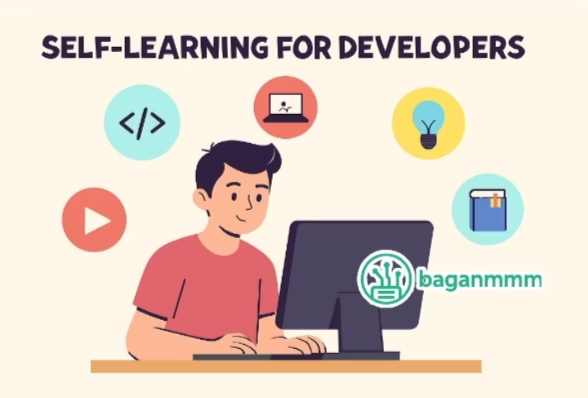This blog is a learning roadmap prepared for senior web developers.
A senior web developer’s daily schedule often leaves very little free time. Because they are constantly solving technical problems, the time available for personal study and learning new technologies becomes very limited. This is a challenge that almost every senior faces. In other fields too, senior‑level professionals encounter the same issue.

However, for those in the technology field, if learning strategies are adjusted to fit their current situation, it is possible to keep learning while working and still reach long‑term success.
In this blog, I will share the self‑learning strategies that I personally follow. Let’s explore these methods together.
5 Key Preparations for Continuous Learning
1. Curate Information Systematically
Prioritize technology‑related news in your social media accounts.
(For example – Hacker News bots, curated newsletters)
Follow thought leaders on GitHub, Twitter/X, and LinkedIn. By doing this, your social media platforms will surface more relevant technical content to you.
2. Test New Theories in Free Time
Note down new theories you come across. Then, during weekends or free days, experiment with them. Don’t just stick to the languages or frameworks you already know try new ones. Compare the strengths and weaknesses of both familiar and new technologies.
Example – Build a real‑time data streaming demo to explore Kafka.
3. Deep Dive into System Design & Architecture
A senior developer should have detailed knowledge of the system design and architecture of a language, framework, or CMS. This knowledge makes real‑world implementation easier, faster, and less error‑prone. Use your free time to read in‑depth books, blogs, and tutorials on these topics.
4. Engage in Open Source & Community
Contributing to open source projects helps you connect with peers and exposes you to new technologies.
There are many niche communities such as Kubernetes SIGs, Rust forums, and domain‑specific Slack groups.
Also, take the lead in mentoring juniors teaching is one of the best ways to learn.
5. Experiment with New Technologies Frequently
Try out emerging technologies in your demo projects for example, cloud‑native (Kubernetes, serverless), or integrating AI/ML into developer workflows. If they prove useful and stable, you can later apply them in real projects.
Incorporate these five practices into your daily life. They are small habits, but once you adopt them, you can effectively pursue self‑learning online. These steps will also give you fresh ideas on how to structure your online learning journey.

Self-learning Websites for Senior Developer
1. Pluralsight
Pluralsight is one of the most respected platforms for developers who want to go beyond syntax and into architecture, DevOps, cloud, and security. It offers expert‑authored courses, curated learning paths, and skill assessments that help you measure progress. For senior engineers, the real value is in the role‑based paths (e.g., solutions architect, cloud engineer) and the ability to dive deep into advanced topics without wasting time on beginner fluff.
2. Frontend Masters
If your focus is front‑end engineering, Frontend Masters is a goldmine. The instructors are industry leaders who teach modern JavaScript, React, TypeScript, performance optimization, and advanced CSS. Unlike generic platforms, it’s laser‑focused on front‑end mastery, making it perfect for senior devs who want to refine their craft and stay ahead of evolving frameworks.
3. Udacity Nanodegrees
Udacity is known for its project‑based Nanodegree programs. These cover AI, data engineering, cloud computing, and cybersecurity. What makes it senior‑friendly is the mentor feedback and real‑world projects you don’t just watch videos, you build things that simulate production scenarios. It’s especially strong if you want to pivot into AI/ML or advanced cloud roles.
4. edX
edX brings university‑level courses from institutions like MIT, Harvard, and Stanford. For senior developers, this is where you can revisit computer science theory, distributed systems, algorithms, and data science at a deeper level. It’s excellent for filling in theoretical gaps or exploring new domains with academic rigor.
5. O’Reilly Learning Platform
O’Reilly is more than just books it’s a full learning ecosystem with live training, interactive sandboxes, and expert talks. It’s particularly valuable for senior developers moving into architecture, leadership, or emerging tech. You can explore everything from microservices design to engineering management in one place.
6. LeadDev
LeadDev isn’t a coding tutorial site it’s a platform focused on engineering leadership, scaling teams, and career growth. It’s packed with articles, talks, and conferences tailored for senior engineers who are stepping into tech lead or manager roles. If you’re thinking about the people and strategy side of engineering, this is where you’ll find guidance.
7. Cloud Academy
For cloud‑focused developers, Cloud Academy offers hands‑on labs, certification prep, and real‑world scenarios across AWS, Azure, and GCP. It’s especially useful if you’re aiming for cloud architect or DevOps leadership roles. The interactive labs let you practice without risking production systems.
8. KataCoda / Instruqt
These platforms provide interactive, browser‑based sandboxes where you can practice DevOps, Kubernetes, and system design scenarios. Instead of watching a video, you’re dropped into a real environment with guided challenges. Perfect for senior devs who learn best by doing, not just watching.
9. LinkedIn Learning
While broader than just coding, LinkedIn Learning is excellent for cross‑disciplinary growth. Beyond advanced tech courses, it offers training in leadership, communication, and business strategy skills senior developers need when moving into architect or engineering manager roles.
Self‑Learning Tips for Senior Devs
- Pick one domain per quarter (e.g., observability, AI tooling, distributed systems).
- Balance theory + practice → read architecture books, then build a small proof‑of‑concept.
- Teach back → blog, mentor, or present internally; teaching cements mastery.
- Track progress → use platforms with skill assessments (Pluralsight, Cloud Academy).
Conclusion
For senior developers, self‑learning is not just about understanding new frameworks or memorizing syntax. Every senior already knows these levels. What truly needs to be learned is, as mentioned earlier, deep learning. You must study and understand the core structures of the languages, frameworks, and CMSs you use.
In addition, you should have a solid grasp of teaching methods, software skills, time management, and technical architecture. With this knowledge, you will be able to manage your juniors and projects effectively.
And you cannot stop at the senior level. The goal for every senior is to become a successful tech lead or technical architect.
To reach this goal, you need to dedicate your free time to self‑study and preparation. This blog aims to provide some guidance for senior developers who want to pursue self‑learning.
Alice is the visionary behind Baganmmm Tech, a platform he founded with a passion for demystifying the complex world of technology. As the Lead Technologist, he's often found in his home lab – a cozy, wire-filled sanctuary where ideas are born and code is meticulously crafted. His infectious enthusiasm and knack for explaining intricate concepts make him the go-to expert for everything from web development to emerging tech trends.
